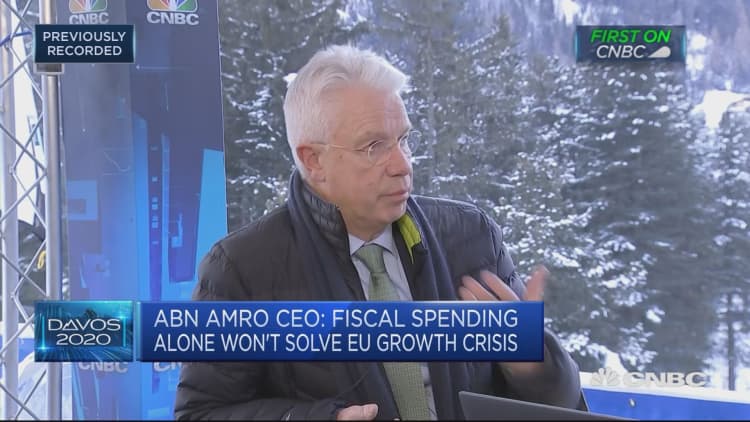
Negative interest rates are the key differentiator preventing European banks from presenting any serious challenge to their American counterparts, according to ABN Amro CEO Kees van Dijkhuizen.
The European Central Bank (ECB) in September cut its main deposit rate by 10 basis points to -0.5%, the lowest in history, and launched a massive quantitative easing program in a bid to stimulate the euro zone economy.
Negative rates mean that banks incur charges for deposits placed with their respective central bank, and van Dijkhuizen said ABN Amro, like a number of other banks across the continent, had promised to insulate clients depositing less than 100,000 euros ($110,996) from negative rates while passing costs on to clients depositing over 2.5 million euros.
"It is not something people like, you have to explain it, and it is a difficult environment for banks to make money," van Dijkhuizen told CNBC at the World Economic Forum in Davos.
"The U.S. doesn't have that problem. It makes it very difficult for Europe now, when another crisis happens, the toolbox — what is left?"
New ECB President Christine Lagarde has promised to review the negative interest rate environment and joined widespread calls for governments with fiscal room to deploy their own stimulus.
However, van Dijkhuizen said that this is also "not easy for governments" and suggested that the economic outlook is "not so bad" compared to what was expected this time last year, which could offer upward momentum to the rate environment.
"The ECB is looking into it, which is good, you see in Sweden the development with the interest rate higher, so I really hope that a more normalized interest level in Europe will come," he added.
Asked whether tax cuts similar to those deployed in the U.S. could be a solution, van Dijkhuizen highlighted that this is not often talked about as a possibility in Europe, with policymakers instead focusing their discussions around infrastructure, particularly in Germany and the Netherlands.
"That's important as well to look into that, but that is of course at the discretion of governments, and that is not going to solve the European growth crisis," van Dijkuizen told CNBC's Geoff Cutmore and Steve Sedgwick.
"It also has to do with entrepreneurship, and taxes are an important thing, and regulation I would say, so there is work to be done in Europe."





